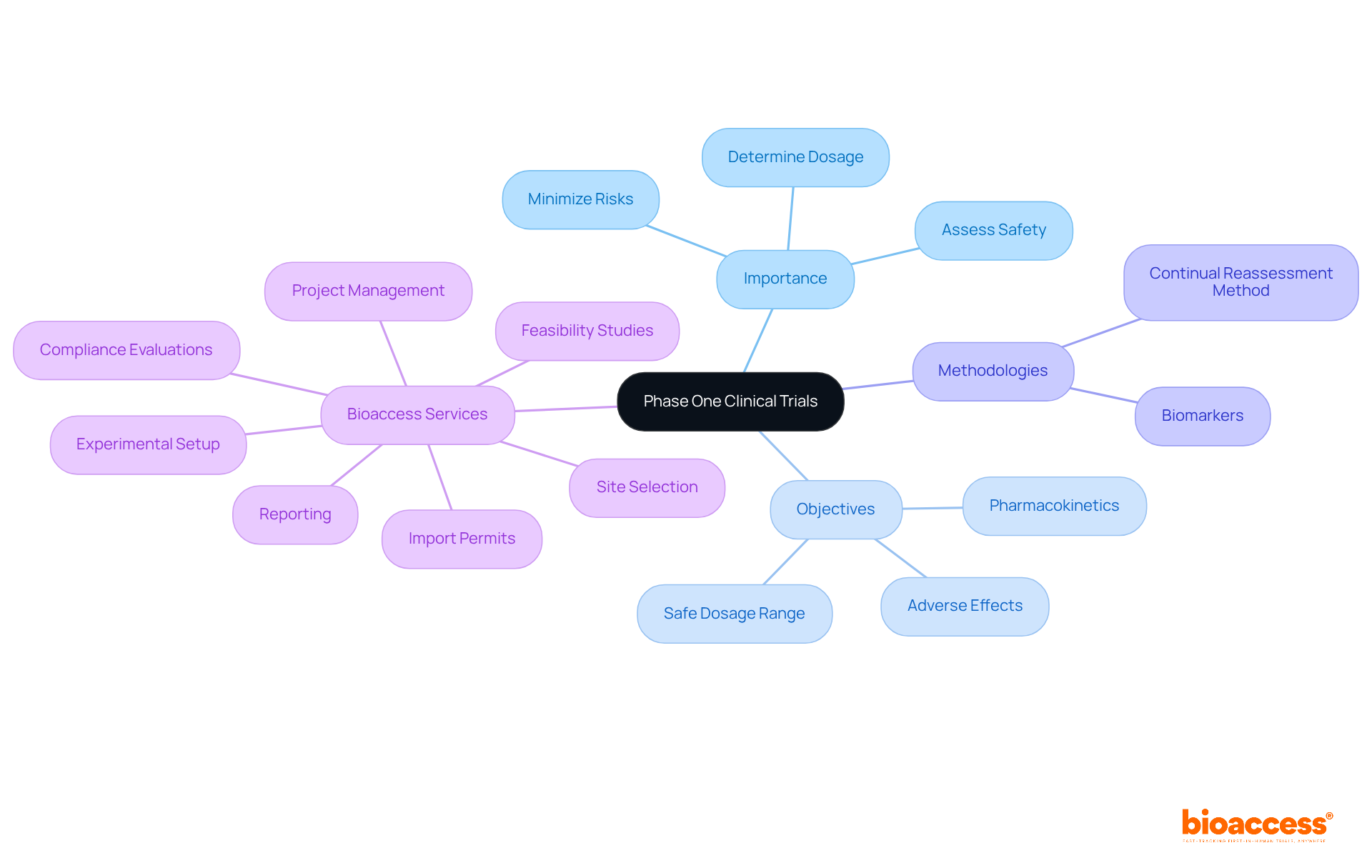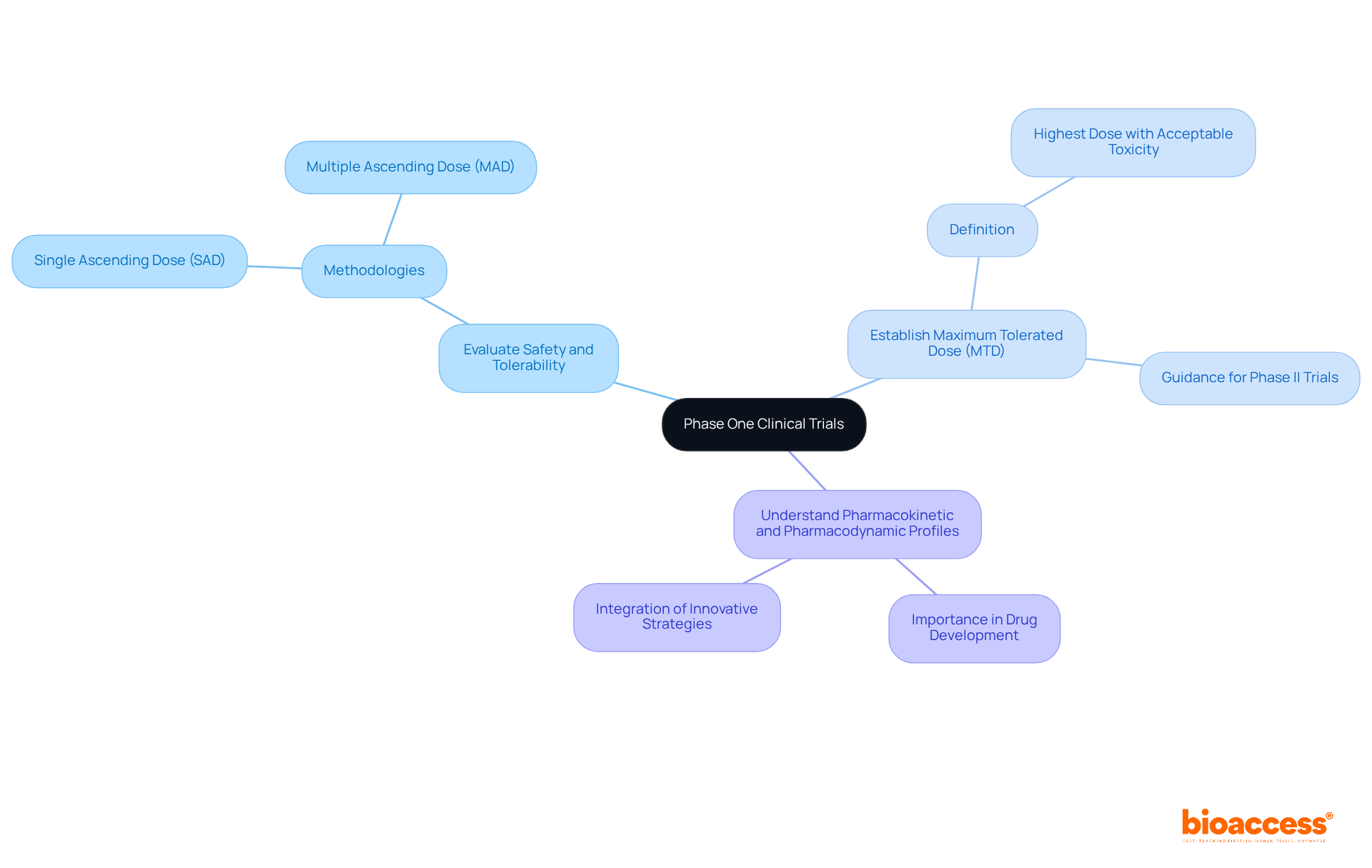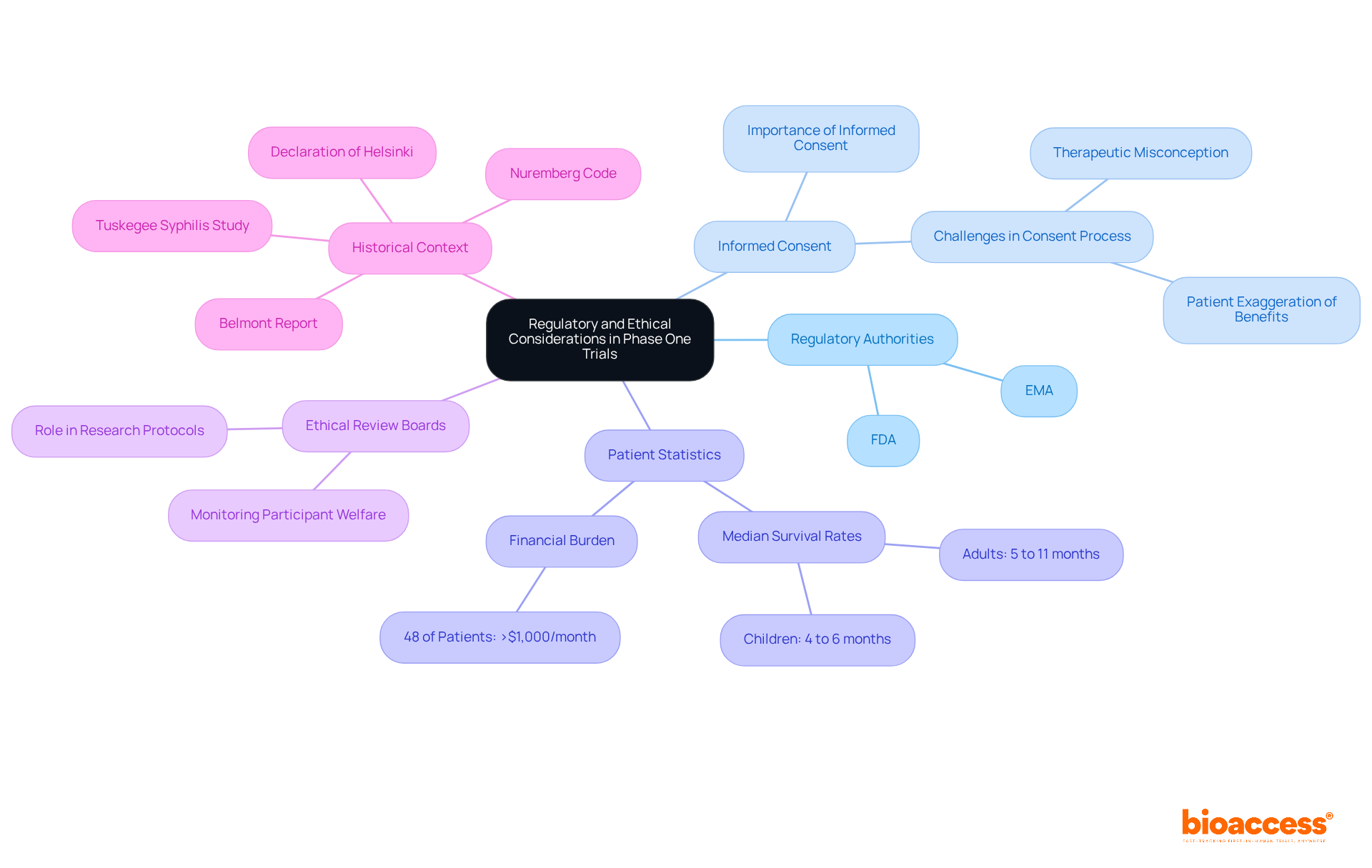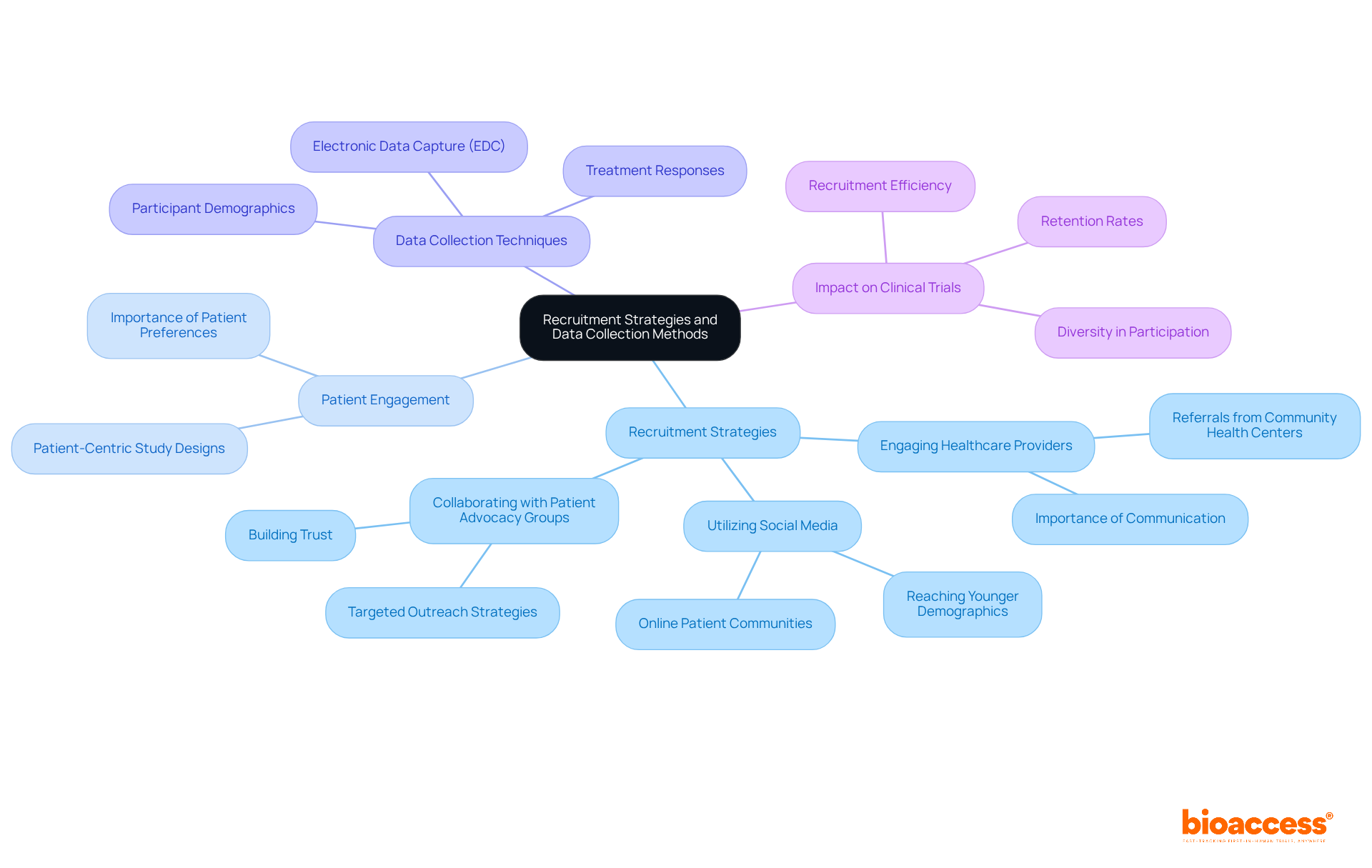


Phase one clinical trials stand as a crucial milestone in the development of new therapies, marking the first opportunity to assess their safety and efficacy in humans. These trials are essential not only for determining critical dosage parameters but also for shedding light on the pharmacokinetic and pharmacodynamic profiles of investigational drugs. As innovative methodologies and ethical considerations come into play, researchers face the pressing question: how can they ensure that these trials are both effective and ethically sound? By delving into the objectives, strategies, and regulatory frameworks that govern phase one trials, we uncover the complexities and opportunities that are intrinsic to the drug development process.
Initial clinical studies signify a crucial phase one clinical trial in the evaluation of new therapies in humans, typically involving 20 to 100 healthy participants. These studies are essential for assessing safety, tolerability, pharmacokinetics - the absorption, distribution, metabolism, and excretion of substances - and pharmacodynamics, which examines the effects of substances on the body. The importance of phase one clinical trials cannot be overstated; they are vital for determining appropriate dosages and identifying potential side effects, thereby minimizing risks in subsequent research stages. This phase not only safeguards participants but also lays the groundwork for the overall success of the development process.
Recent advancements in the early testing stages have introduced innovative methodologies, such as the Continual Reassessment Method (CRM). This approach allows for real-time dose adjustments based on patient responses, significantly enhancing both safety and efficiency. For instance, the rising incorporation of biomarkers in these studies provides valuable insights into patient selection and drug effectiveness.
Bioaccess offers comprehensive clinical study management services that optimize the Stage One process. Their capabilities include:
This holistic approach accelerates the regulatory approval process - achieving it in 6 to 8 weeks compared to the typical 6 to 12 months in the US/EU - and enables the enrollment of treatment-naive cardiology or neurology cohorts 50% faster than Western sites.
Statistics underscore the significance of Stage One experiments: approximately 75% of Stage One studies in academia report success in advancing to subsequent phases, yet the overall transition rate from Stage One to approval hovers around 10%. This highlights the critical nature of this phase within the broader context of medication development.
Key objectives of the phase one clinical trial include:
As emphasized by the FDA, these studies represent the initial exposure of humans to investigational substances, making ethical oversight and participant safety paramount. The insights gained during this phase are instrumental in shaping the trajectory of medication development, ultimately influencing the success of new therapies in the market.

Phase one clinical trial studies play a crucial role in the drug development process. Their main goals include evaluating the safety and tolerability of medications, establishing the maximum tolerated dose (MTD), and understanding the pharmacokinetic and pharmacodynamic profiles. Methodologies employed in these studies, such as single ascending dose (SAD) and multiple ascending dose (MAD) designs, are essential for gathering reliable data that lays the groundwork for subsequent clinical phases.
In SAD studies, participants typically receive increasing doses of the drug, often involving 10 to 30 individuals, to identify the MTD. Conversely, MAD studies administer multiple doses to assess the drug's effects over time. These approaches are vital for ensuring that the data collected is comprehensive and trustworthy. The MTD, defined as the highest dose that can be given with an acceptable level of toxicity, often guides the recommended dose for the phase one clinical trial.
Moreover, the design of these studies must adapt to the complexities of modern oncology. This requires collaboration between clinical and statistical teams to ensure that the chosen methodologies effectively meet research objectives. As Nolan A Wages aptly noted, 'To design and conduct a proper contemporary dose-finding study, inclusion of statisticians as part of the study team at the early stages of the process is essential.' Recent research underscores the importance of integrating innovative dose-finding strategies to tackle the unique challenges posed by targeted therapies and immunotherapies.
Case studies, such as 'Food Effect Studies in Stage 1 Trials,' illustrate practical applications of these methodologies, emphasizing their significance in advancing drug development. By fostering collaboration and embracing innovative approaches, the clinical research community can better navigate the evolving landscape of early-stage studies.

Regulatory and ethical factors in initial stage studies are crucial for protecting participant welfare and maintaining the integrity of clinical information. Regulatory authorities, such as the FDA and EMA, enforce strict guidelines that govern study conduct. A key ethical principle is obtaining informed consent, where participants must be fully apprised of potential risks and benefits. This is especially vital since individuals in the initial stages of testing often have severe conditions and may exaggerate the therapeutic benefits of involvement, complicating the informed consent process.
Statistics reveal that the median survival for patients in Stage One studies ranges from 5 to 11 months, underscoring the urgency and ethical complexity of these investigations. Additionally, a significant 48% of patients in the phase one clinical trial reported monthly out-of-pocket expenses exceeding $1,000, raising concerns about equitable access to these studies.
Ethical review boards play a critical role in supervising research protocols, ensuring that the rights and welfare of participants are prioritized. Historical case studies, such as the Tuskegee Syphilis Study, highlight the dire consequences of unethical practices, reinforcing the necessity for rigorous ethical standards. Recent regulatory updates, including the FDA's final ICH E6(R3) guidance, advocate for flexible, risk-based approaches in study design, emphasizing the importance of ethical oversight in evolving clinical landscapes.
Furthermore, the Declaration of Helsinki and the Belmont Report provide essential ethical frameworks that assist researchers in ensuring participant safety and transparency throughout the research process. As phase one clinical trial tests continue to evolve, it remains crucial to incorporate ethical considerations into study design and execution, ensuring that scientific progress does not come at the expense of participant rights and well-being.

Effective recruitment strategies are crucial for the success of phase one clinical trials. Engaging healthcare providers, utilizing social media platforms, and collaborating with patient advocacy groups significantly enhance awareness about clinical studies. Notably, over 90% of patients express a desire to discuss research opportunities with healthcare experts, underscoring the importance of communication in recruitment initiatives. Furthermore, adopting patient-focused study designs can improve participation rates by addressing the specific needs and preferences of potential participants.
bioaccess® has demonstrated expertise in accelerated patient recruitment and site activation services, achieving over a 50% reduction in recruitment time and 95% retention rates through FDA/EMA/MDR-compliant datasets. Their partnership with Caribbean Health Group aims to establish Barranquilla as a leading location for clinical studies in Latin America, supported by Colombia's Minister of Health. This collaboration leverages pre-qualified networks and swift site activation to enhance the efficiency of clinical studies.
Data collection techniques in a phase one clinical trial primarily utilize electronic data capture (EDC) systems, simplifying the recording process and ensuring precision. Researchers should prioritize gathering comprehensive data on participant demographics, treatment responses, and any adverse effects experienced during the study. This information is vital for evaluating the safety and effectiveness of investigational drugs, ultimately guiding informed decisions about their progression to later study phases. The integration of real-world examples of patient-centric designs illustrates the evolving landscape of clinical trials, where patient engagement and satisfaction are increasingly recognized as critical components of successful research.

Phase one clinical trials are the cornerstone of drug development, providing essential insights into the safety and effectiveness of new therapies. These trials assess not only the pharmacokinetic and pharmacodynamic profiles of investigational drugs but also play a crucial role in determining safe dosage ranges and identifying potential side effects. The emphasis on ethical oversight and participant safety highlights the significance of this phase, as it directly influences the success of subsequent research stages and the overall development of new treatments.
This article explored the key objectives and methodologies of phase one clinical trials, showcasing innovative approaches such as the Continual Reassessment Method and the integration of biomarkers. Effective recruitment strategies and data collection methods were discussed, illustrating how patient engagement and advanced technology can enhance the trial process. Furthermore, the importance of regulatory and ethical considerations was underscored, demonstrating the necessity for rigorous standards to protect participants and ensure the integrity of clinical data.
As the landscape of clinical research evolves, it is imperative for stakeholders to prioritize the ethical and scientific rigor of phase one trials. By embracing innovative methodologies, fostering collaboration among research teams, and focusing on participant welfare, the clinical research community can navigate the complexities of drug development more effectively. Ultimately, a commitment to ethical practices and robust study designs will pave the way for successful advancements in medical therapies that can transform patient care.
What are phase one clinical trials?
Phase one clinical trials are initial studies that evaluate new therapies in humans, typically involving 20 to 100 healthy participants. They are crucial for assessing safety, tolerability, pharmacokinetics, and pharmacodynamics of new substances.
Why are phase one clinical trials important?
They are vital for determining appropriate dosages, identifying potential side effects, and minimizing risks in subsequent research stages. This phase also safeguards participants and lays the groundwork for the overall success of the development process.
What methodologies have been introduced in phase one clinical trials?
Recent advancements include the Continual Reassessment Method (CRM), which allows for real-time dose adjustments based on patient responses, and the incorporation of biomarkers for better patient selection and drug effectiveness.
What services does Bioaccess provide for phase one clinical trials?
Bioaccess offers comprehensive clinical study management services, including feasibility studies, site selection, compliance evaluations, experimental setup, import permits, project management, and reporting.
How does Bioaccess optimize the regulatory approval process for phase one trials?
Their holistic approach accelerates the regulatory approval process to 6 to 8 weeks, compared to the typical 6 to 12 months in the US/EU, and enables faster enrollment of treatment-naive cardiology or neurology cohorts.
What statistics highlight the significance of phase one clinical trials?
Approximately 75% of phase one studies in academia report success in advancing to subsequent phases, yet the overall transition rate from phase one to approval is around 10%.
What are the key objectives of phase one clinical trials?
The key objectives include establishing a safe dosage range, assessing pharmacokinetics and pharmacodynamics, and identifying any adverse effects.
What is the ethical importance of phase one clinical trials?
Since these studies represent the initial exposure of humans to investigational substances, ethical oversight and participant safety are paramount. The insights gained are essential for shaping medication development and influencing the success of new therapies.